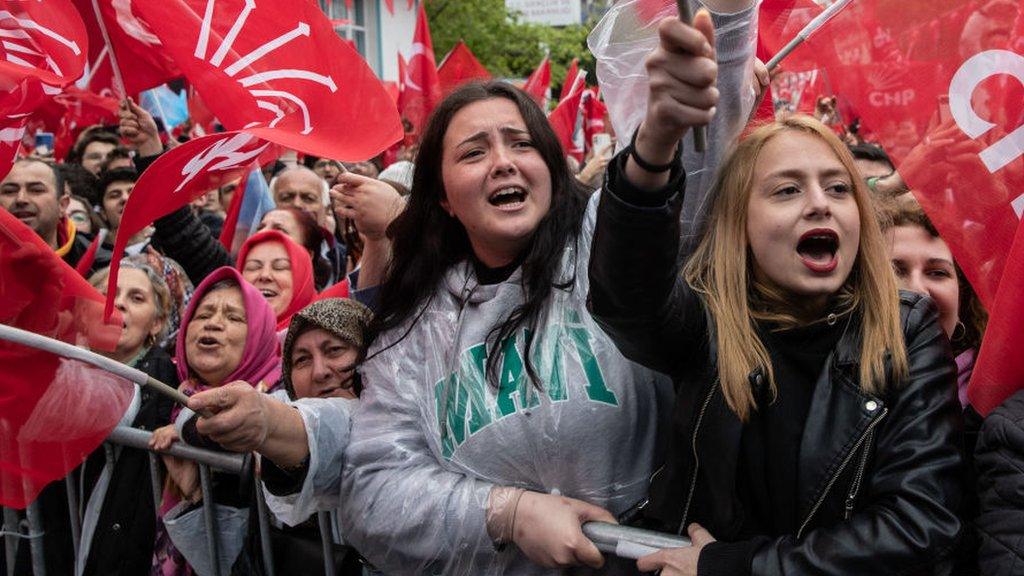Turkey decides on future with or without Erdogan
- Published
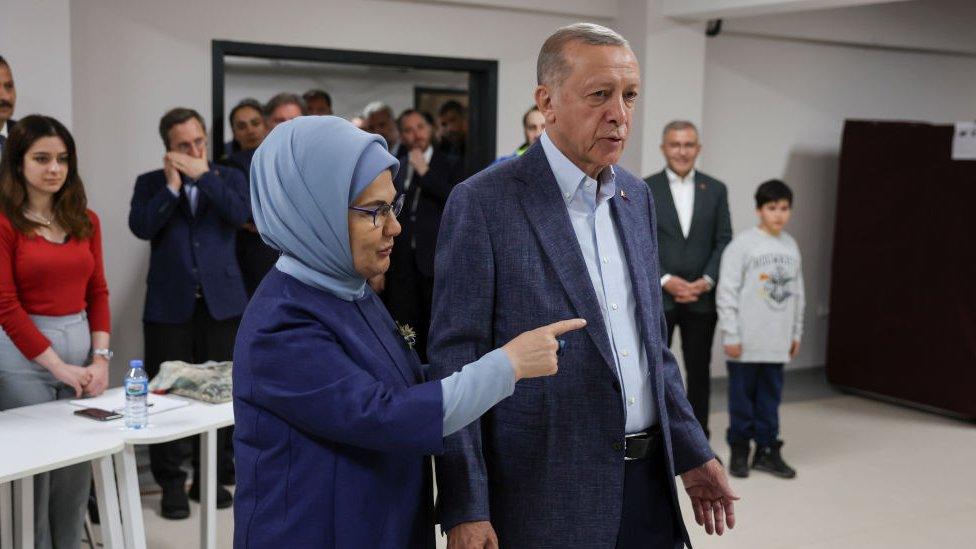
Crowds greeted President Erdogan and his wife Ermine as they voted in Istanbul
Polls have closed in the most pivotal elections in Turkey's modern history, to decide if Recep Tayyip Erdogan stays president after 20 years in power.
His main rival, Kemal Kilicdaroglu, promises to scrap many of the powers acquired by President Erdogan after he survived a failed coup in 2016.
Buoyed by a broad opposition alliance, he has a real chance of winning.
Two issues have troubled Turkey's 64 million voters more than anything: soaring inflation and two earthquakes.
But many voters are also looking for change after two decades.
Mr Kilicdaroglu promises this Nato member state a path back towards a pro-Western, more democratic stance, while President Erdogan's Islamist-rooted government has accused the West of plotting to bring him down.
The race has become febrile in recent days and voters queued at polling stations even before they opened.
In Antakya, one of the cities hardest hit by the February earthquakes, more than 100 buses arrived bringing people displaced by the disaster so they could vote. Eleven of the country's provinces have been affected.
To secure outright victory on Sunday, the winner needs more than 50% of the vote. Otherwise it goes to a run-off in two weeks' time.
Mr Kilicdaroglu, 74, arrived at a packed polling station at an Ankara school to chants of "everything will be all right", while one voter shouted out "grandpa", which has become a term of affection for young voters.
Sima, who came with her friend Pilay to welcome him, said she was excited at the thought of change after more than 20 years.
I came here to see Kilicdaroglu. Under him things can be different - he hugs everybody
Rampant inflation in Turkey is officially almost 44%, but many believe it is far higher.
At an optician's in Ankara, Burak Onder complained that hardly anyone was buying glasses any more: "People don't even ask for discounts, they can't afford it."
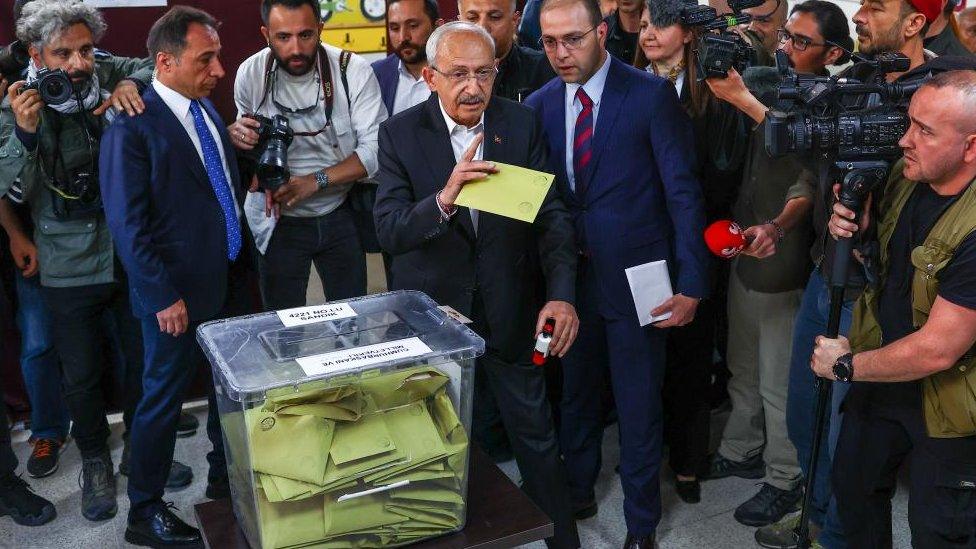
The opposition presidential candidate was cheered by well-wishers as he arrived to vote
Inflation soared as President Erdogan abandoned orthodox economics, cutting interest rates while most other countries raised theirs.
A few doors down the street, shopkeeper Rahime revealed layers of price labels that she stuck on top of each other almost daily because of soaring costs.
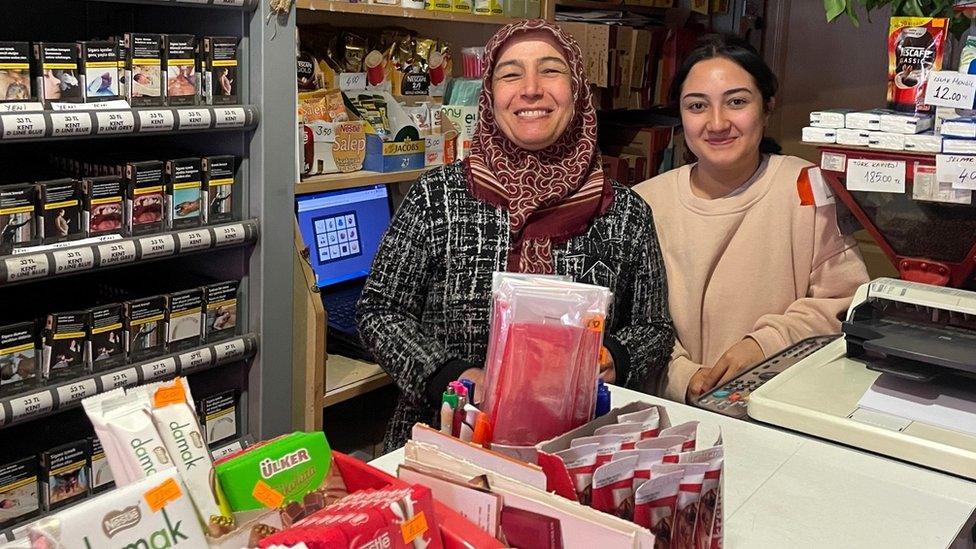
Rahime's daughter, Sudenur, (R) is one of five million first-time voters in Sunday's election
Rahime's 19-year-old daughter Sudenur feels she may be unable fulfil her ambition of studying sport science.
As a first-time voter, she and five million others like her are expected to make a big difference to the election result.
Many young voters want an end to restrictions on media, tightened dramatically during President Erdogan's rule.
Hours before the vote, Twitter announced it had agreed to restrict access to some content in Turkey, prompting angry reaction.
But Twitter boss Elon Musk replied: "The choice is have Twitter throttled in its entirety, external or limit access to some tweets. Which one do you want?"
Turks have until 17:00 (14:00 GMT) to vote, although 1.76 million have already cast their ballots abroad in Germany, France and other countries - a record 53% turnout.
For many survivors forced to leave their homes after the 6 February earthquakes, voting means returning to the home towns where they are registered.
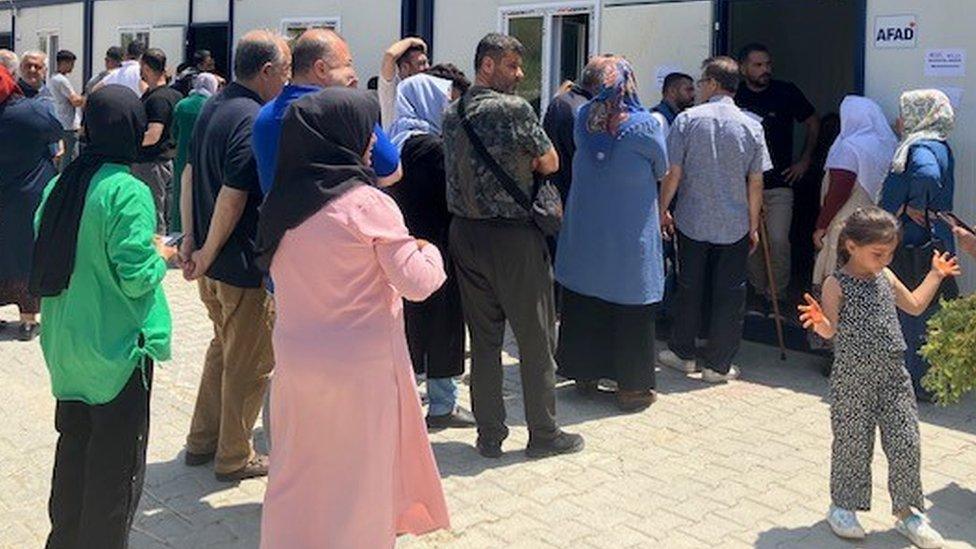
Voting in Antakya took place in portable containers because the polling stations were unsafe
Some of those returning to the south-eastern city of Antakya had come only to cast their votes. A few were using the moment to move back home, loading suitcases and heavy bags on to pick-up trucks.
"We want our living standards to increase again. We have been through so much," one man said after an 18-hour bus journey with his wife and three children.
All day, there were long queues of voters outside a row of containers converted into temporary polling stations. The school where voting would usually take place and dozens of tower blocks in the neighbourhood have cracked walls and are deserted.
In Adana, where hundreds of people died in collapsed buildings, there is still palpable anger about the response.
"I think the earthquake will affect the outcome of the elections seriously, because people feel resentful to the government, if not the state," said Ezgi Karaher as she walked with her young daughter in the park.
Not everyone is able to go back. Two women at an Ankara supermarket told the BBC they would miss out on voting because they were having medical treatment following the earthquake.
And tensions have increased in the run-up to polling day.
Opposition parties are deploying volunteers to ensure the 192,000 ballot boxes and results are properly scrutinised to avoid the risk of fraud.
One of the four presidential candidates, Muharrem Ince, pulled out of the race three days ago, citing a smear campaign of "character assassination". But it was too late to remove his name from the ballot.
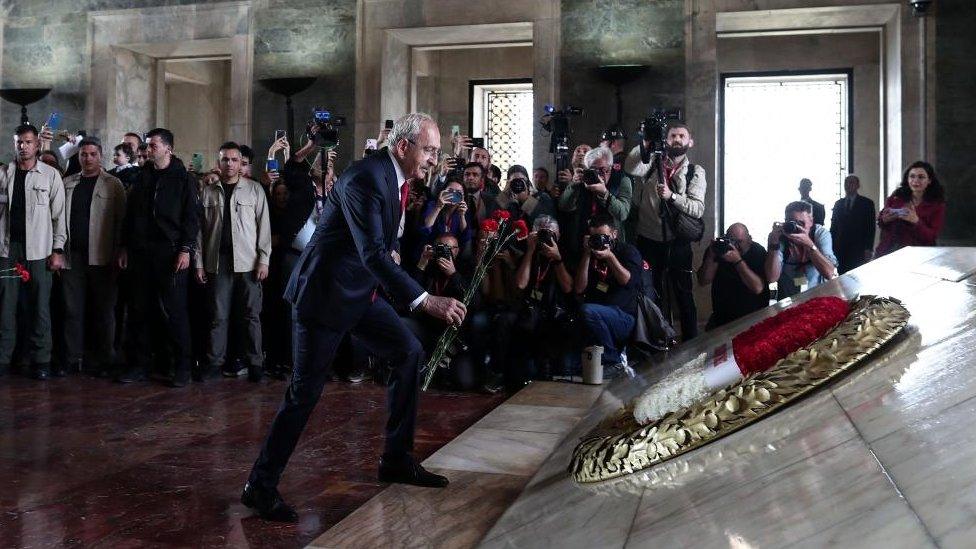
Mr Kilicdaroglu visited Anitkabir - Ataturk's mausoleum - on the eve of the vote
The race for the presidency has become so intense and the stakes so high that campaigning went up to the wire.
President Erdogan, who is 69, was filmed stretching election rules by addressing worshippers after he led Saturday evening prayers at Hagia Sophia mosque in Istanbul.
Video shared on social media showed him telling worshippers the Muslim world was closely following events in Turkey.
His choice of venue and his decision to give a political speech after campaigning had officially ended was controversial, and highly symbolic to his supporters.
Hagia Sophia, originally built as an Orthodox Christian cathedral, was a mosque under the Ottomans. But Ataturk turned it into a museum and it was President Erdogan who defied secular Turkey's founder and made it a mosque once more in 2020.
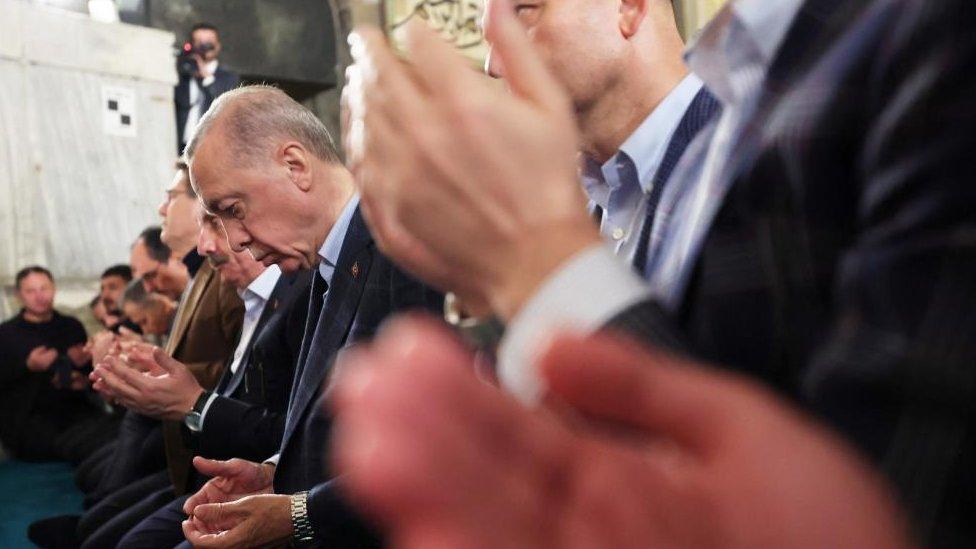
Mr Erdogan ended his election push with Saturday prayers at Hagia Sophia mosque in Istanbul
Ultra-nationalist Sinan Ogan is the only other presidential candidate.
But Turks are also voting for parliament and its 600 MPs. Although they have lost powers to Mr Erdogan's executive presidency since 2018, control of parliament remains key for passing legislation.
Under Turkey's proportional voting system, parties form alliances so they can reach the 7% threshold required to enter parliament.
The president's AK Party, which has Islamist roots, is part of the People's Alliance with the nationalist MHP and two other parties, while Mr Kilicdaroglu's centre-left Republican People's Party is working with the nationalist Good Party and four smaller parties under the Nation Alliance.
The pro-Kurdish HDP, Turkey's second biggest opposition party, is part of another alliance, but has campaigned under a different name, the Green Left.
- Published23 May 2023
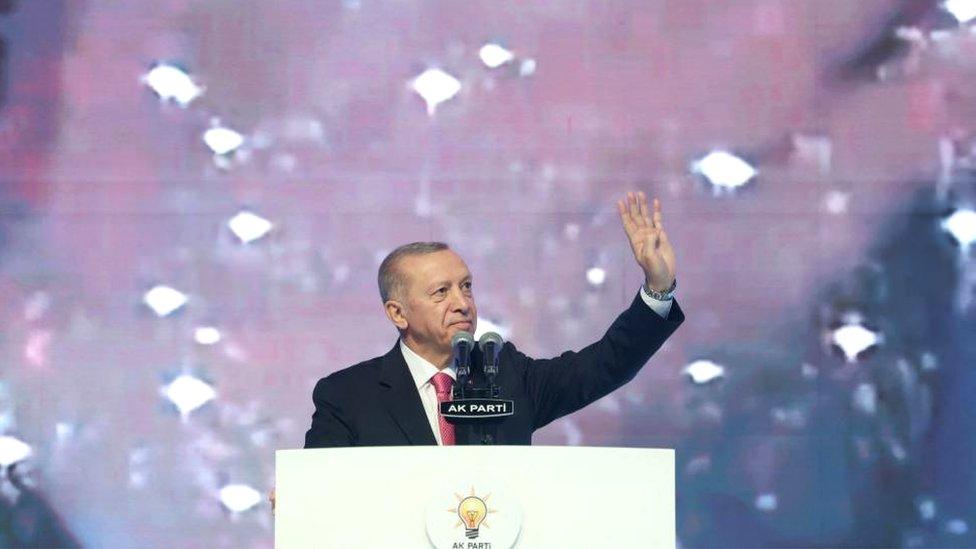
- Published13 May 2023
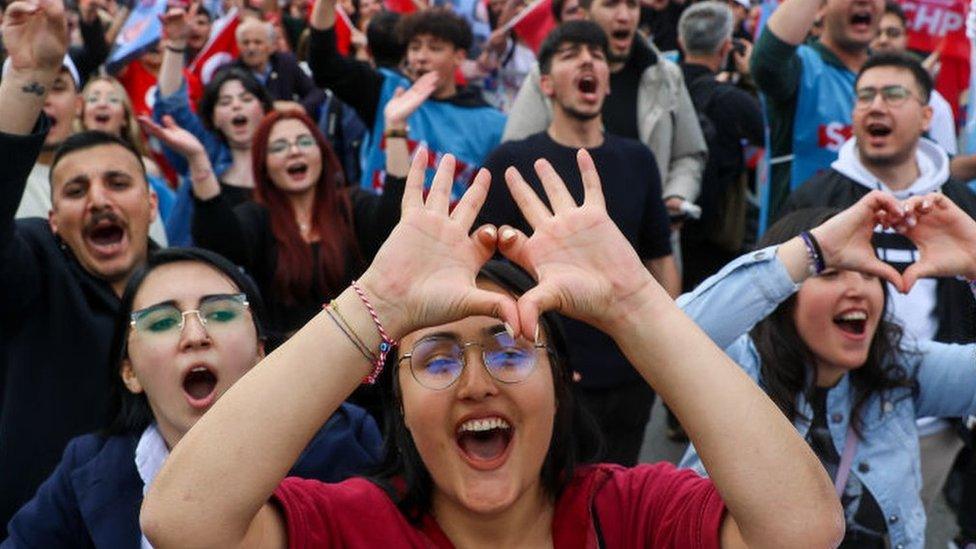
- Published11 May 2023
